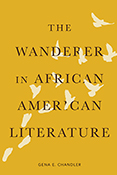The Wanderer in African American Literature

The Wanderer in African American Literature highlights an enduring feature of African American letters: “From the slave narrative to Afrofuturism, the literature is populated, driven, and emboldened by wanderers who know no bounds.” Gena E. Chandler argues that wanderers and the theme of wandering push the limits of narrative forms and challenge assumptions about the African American experience.
The slave narratives of Olaudah Equiano and Harriet Jacobs echo eighteenth-and nineteenth-century literary traditions and chronicle journeys toward freedom and faith. Equiano traces his changing identity, integrating his native African culture with his adopted European one. Jacobs addresses the gender restrictions she faces as a slave and then a free woman whose progress in life remains uncertain and ongoing.
Langston Hughes and Nella Larsen chronicle real and imagined journeys during the Harlem Renaissance and the Great Migration. Hughes’s autobiography I Wonder as I Wander (1956) traces his global travels in the 1930s, highlighting his unique identity as a black American. Larsen’s novel Quicksand (1928) follows its biracial heroine as she travels throughout the United States and to Denmark while navigating matters of race and gender.
The protagonist of Richard Wright’s The Outsider (1953) seeks individual freedom and a new identity but is “constrained within the boundaries of an American nation and a Western ideal that continuously views the black subject as outside and distinct from the modern project of advancement and freedom.” In James Baldwin’s Giovanni’s Room (1956), the white protagonist flees America for France yet cannot escape difficult questions about sexuality and race.
Finally, John Edgar Wideman’s The Cattle Killing (1996) tells the story of two wanderers—an itinerant preacher spreading God’s word during the Great Awakening and a twentieth-century writer on a journey of self-discovery about his identity and vocation. The former experiences a crisis of his Christian faith, and the latter endures a crisis of faith in his literary abilities.
Tying these diverse threads together, Chandler demonstrates the power of the black narrative to assimilate and redeploy the literary trope of wanderlust, exchanging its premise of rootless drifting for something altogether more mobilizing.
GENA E. CHANDLER is an associate professor of English at Virginia Tech. Her articles have appeared in Texas Studies in Literature, and in the edited collections New Essays on the African American Novel: From Hurston and Ellison to Morrison and Whitehead and Charles Johnson: The Novelist as Philosopher.
